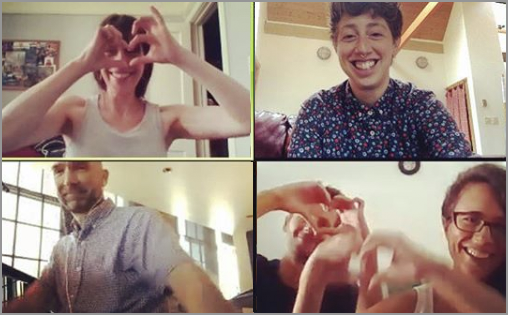Recently, I ran into a particularly sticky life problem—one of those problems that kept me tossing and turning many nights. Typically, around 3:00 a.m. it would suddenly decide to wake me up and start shouting about itself.
Even after I flipped my sweaty pillow over to the cold side and tried some relaxing breaths, my problem would continue whispering to me. At least it wasn’t shouting anymore, but the constant nattering in my brain was keeping me from much-needed sleep. I figured that, as long as I was awake, I may as well try listening to my problem. I thought maybe I could come up with a solution, so it would finally leave me alone.
Later, I was chiding myself. I should have known better. After hours of midnight attention, my problem was snuggled up even tighter with me and would not let me rest.
I began to think that maybe over-focusing was the thing that was preventing me from solving my problem.
What we do when we encounter a problem
For me, over-focusing only happens when encountering a problem that’s bigger than, say, being out of peanut butter. (That kind of problem is easily solved: A. Put jam on my toast, or B. Go to the store and get more peanut butter.) If I wake up realizing that my household is, once again, out of peanut butter, it only takes a moment to calm myself back to sleep with easy solutions.
With bigger or more perplexing problems, I tend to stop everything to focus on the problem. It sounds like the right approach—how can I expect to find a solution while ignoring a problem? But then something paradoxical and horrible happens: instead of coming up with a solution, I fixate on having the problem. I find myself working on ways to not have had the problem in the first place. My mind comes up with all kinds of silly tricks:
- Attempt to find a way around the problem. This works about as well as believing that a detour through an alley could, in itself, fix a pothole on the road.
- Try to ignore the problem. We’ve already seen what happens when I try to use this trick. My problem wakes me up at night like a toddler with a monster in their closet.
- Give the problem to someone else to solve. I would never do this to a friend or loved one just so I can get some shut-eye! Social media, on the other hand, seems perfect for handing off the problem baton. This never works, however. In the end, someone always replies, “Try sleeping on it,” and I’m back to square one.
Is there a productive way to put problems aside?
Ignoring problems is almost a global pastime, and it’s not really understood to be an effective response. But what if I simply stopped thinking about my problem? After enough sleepless nights, I was ready to take this seriously. If I stopped focusing on my problem and busied myself with something else entirely, I thought I might come up with a solution.
Initially I was suspicious of this technique, because it sounds a little too closely related to ignoring it. But, I told myself, I wouldn’t be ignoring the problem. I needed a way to defer my problem and address other things, all while still acknowledging the existence of my problem and knowing that I needed to solve it.
How we think about problems impacts our ability to problem-solve
In her book, A Mind for Numbers, Dr. Barbara Oakley gives us a framework for different ways of using our minds. These different modes are best suited to different types of tasks and situations, and sometimes when one isn’t working, it’s a good idea to change gears. In the book, Oakley explains that our minds are usually engaged in one of two modes: Focus Mode and Diffuse Mode.
Focus Mode is just like it sounds. We are concentrating on a task or problem with our conscious minds. We’re actively engaged in completing or solving it. In the case of my monstrous, sleep-stealing problem, Focus Mode wasn’t working very well. In fact, I was often slipping into over-focus. Rather than helping me brainstorm good solutions, Focus Mode often leaves me hyper-focused on getting around “the problem.”
Diffuse Mode is when our minds drift into other things besides the problem at hand—like what groceries we need (obviously peanut butter), or getting the car washed. Mundane, everyday tasks can shift us right into Diffuse Mode. That’s why we tend to come up with our most brilliant ideas in the shower or driving on the highway.
Diffuse Mode is the mind going “big-picture”. It literally means that our thoughts are diffused throughout the brain rather than focused in one area, allowing us to gain insights we wouldn’t have in Focus Mode. Knowing this, we can actively engage Diffuse Mode and let our minds untangle the messy problem without our stressed-out selves getting in the way.
Rather than laying in bed with my problem kicking me in the back, I tried getting up and reading a novel for a while. I was able to relax and allow myself to not work on my problem. Eventually, I was able to sleep, and the next day had a path to solving the problem—one that likely would have taken me much longer to come up with if I was sleep-deprived and obsessing about the problem.
Our multipotentialite superpowers can help us use Diffuse Mode
As multipods, we basically can’t stop exploring varied interests. When it comes to tackling difficult problems, this is a huge advantage. When we get stuck on a problem in one area, we can easily switch over to something else and let our minds slip into Diffuse Mode for a while.
Whenever I’ve tried this myself, it works wonders. Although it sometimes takes me a while to get my head out of the super chunky problem I’m currently dealing with, it’s always worth it. Sometimes, I can actually feel my mind loosen up as I get deeper into a new thing. It can take a day or two, but when I circle back to a big problem I often have a new perspective. Sometimes, I even have a solution!
Your turn
What do you do when a particularly tricky problem shows up in your life? Do you prefer to focus on it intensely until it’s solved, or set it aside while your mind works on something else? Share your techniques in the comments!

Doing/being/exploring ALL THE THINGS is easier with a community!

Did you know we have a private community of hundreds of multipotentialites from around the world? We support each other, share advice and cheer each other on as we building lives and career around ALL our passions.
Learn more about the Puttyverse and get notified next time we open the doors:


Add to the conversation...